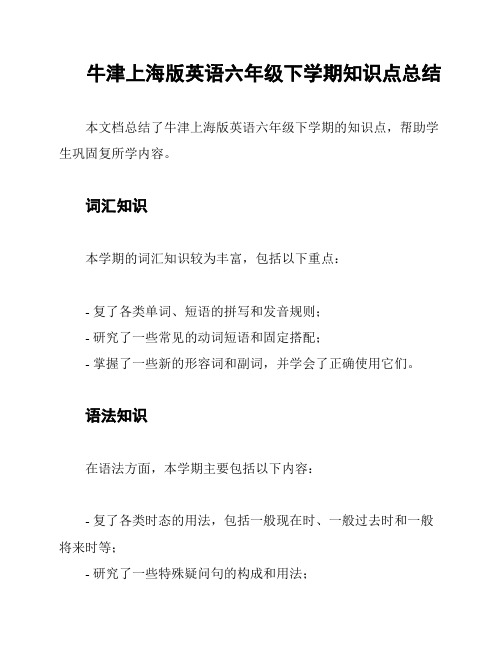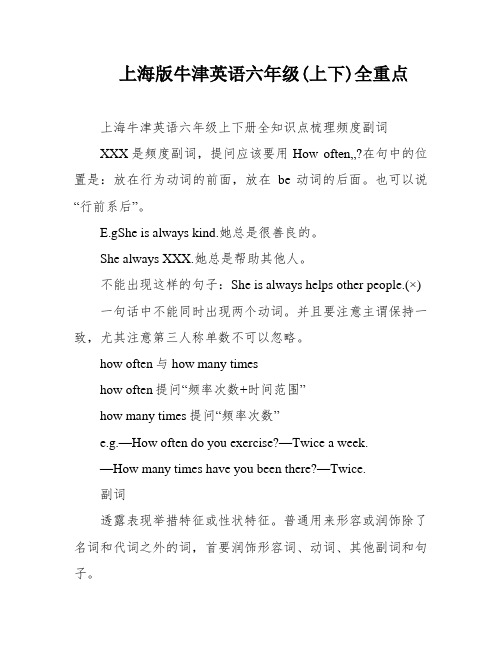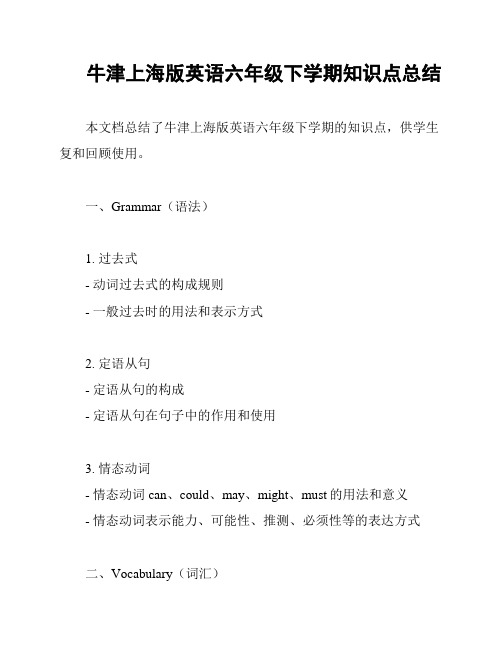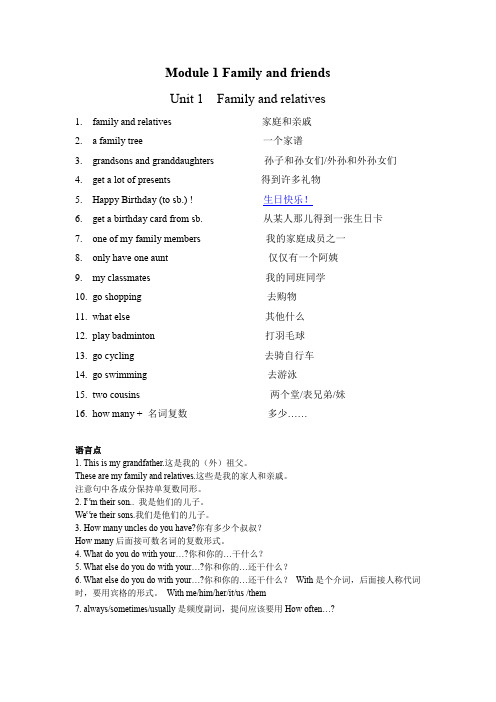牛津上海版(深圳)英语六年级总复习知识点总结
牛津上海版英语六年级下学期知识点总结

牛津上海版英语六年级下学期知识点总结
本文档总结了牛津上海版英语六年级下学期的知识点,帮助学生巩固复所学内容。
词汇知识
本学期的词汇知识较为丰富,包括以下重点:
- 复了各类单词、短语的拼写和发音规则;
- 研究了一些常见的动词短语和固定搭配;
- 掌握了一些新的形容词和副词,并学会了正确使用它们。
语法知识
在语法方面,本学期主要包括以下内容:
- 复了各类时态的用法,包括一般现在时、一般过去时和一般将来时等;
- 研究了一些特殊疑问句的构成和用法;
- 掌握了简单句和复合句的结构和连接方式。
阅读技巧
研究英语的过程中,阅读技巧尤为重要。
本学期的阅读内容主要包括:
- 阅读短文理解文章大意;
- 提炼短文中的关键信息;
- 理解并回答问题。
书写规范
书写规范是英语研究中不可或缺的一部分。
本学期重点培养了学生的书写规范,包括:
- 规范的字母大小写;
- 字母书写的方向和连写规则;
- 单词之间空格的正确使用。
通过本文档的总结,希望学生们能够回顾所学的知识点,强化理解和记忆,提高自己的语言运用能力。
上海版牛津英语六年级(上下)全重点

上海版牛津英语六年级(上下)全重点上海牛津英语六年级上下册全知识点梳理频度副词XXX是频度副词,提问应该要用How often…?在句中的位置是:放在行为动词的前面,放在be动词的后面。
也可以说“行前系后”。
E.gShe is always kind.她总是很善良的。
She always XXX.她总是帮助其他人。
不能出现这样的句子:She is always helps other people.(×) 一句话中不能同时出现两个动词。
并且要注意主谓保持一致,尤其注意第三人称单数不可以忽略。
how often与how many timeshow often提问“频率次数+时间范围”how many times提问“频率次数”e.g.—How often do you exercise?—Twice a week.—How many times have you been there?—Twice.副词透露表现举措特征或性状特征。
普通用来形容或润饰除了名词和代词之外的词,首要润饰形容词、动词、其他副词和句子。
XXX happy.(修饰形容词)The old lady is XXX.(修饰动词)Luckily, he got the first prize.(润饰句子)形容词后面+ly组成副词:slow—slowlyslight—XXX—luckilyhappy—happily介词What else do you do with your…?你和你的…还干什么?With是个介词,后面接人称代词时,要用宾格的形式。
With me/him/her/it/us /them在详细的某一楼层只能用介词on,而且第几层还要用序数词On the ground floor, on the first floor, on the XXX详细的某一天介词只能用onOn Sunday, On Sunday morning,On the Open Dayhe one on the left/right左边/右边的这个the one in the middle中间的这个如果是介词短语修饰the one,应该要放在the one后面,如果是形容词应放the one的中间the left/right onethe middle oneXXX XXX在周末目前完成时现在完成时的构成是:have/has +动词的过去分词。
牛津上海版英语六年级下学期知识点总结

牛津上海版英语六年级下学期知识点总结
本文档总结了牛津上海版英语六年级下学期的知识点,供学生复和回顾使用。
一、Grammar(语法)
1. 过去式
- 动词过去式的构成规则
- 一般过去时的用法和表示方式
2. 定语从句
- 定语从句的构成
- 定语从句在句子中的作用和使用
3. 情态动词
- 情态动词can、could、may、might、must的用法和意义
- 情态动词表示能力、可能性、推测、必须性等的表达方式
二、Vocabulary(词汇)
1. 动词短语
- 动词短语的构成和用法
- 常用的动词短语及其意义
2. 名词短语
- 名词短语的构成和用法
- 常用的名词短语及其意义
3. 形容词和副词
- 形容词和副词的构成和用法
- 常用的形容词和副词及其意义
三、Reading(阅读)
1. 阅读理解
- 阅读理解题的解题技巧和策略- 阅读理解题型的种类和难度分布
2. 短文阅读
- 熟悉短文阅读中常见的词汇和句子结构
- 提高对短文主旨和细节的理解能力
四、Writing(写作)
1. 书信写作
- 书信写作的格式和语言表达
-如何正确使用称呼和结束语
2. 日记写作
- 日记写作的格式和内容要求
- 如何描述事件和个人感受
以上是牛津上海版英语六年级下学期的知识点总结。
希望同学们能够仔细复,并在考试中取得好成绩!。
(完整word)牛津沪教版英语六年级上重点知识复习及练习

1.In the writer’s opinion, the most effective way in learning English is ____.A.to practise speaking, writing and feeling itB.to forget your own native languageC.to translate everything into his own languageD.to memorize the English words and grammatical rules2. “Instead of helping you, your own language gets in your way.”This sentence means that memorizing your own language can ________.A.help you to study English wellB.stop you mastering EnglishC.make English easy to learnD.help you notice mistakes3.Eq ually important is to feel the language. “to feel the language” here means________.A.to get a knowledge of English by touchingB.to be able to read and write EnglishC.to translate English into your own by imaginingD.to be able to experience the rich sensation of the languageBWhen we can see well, we do not think about our eyes often. It is only when we can not see perfectly that we come to see how important our eyes are.People who are nearsighted can only see things that are very close to their eyes. Many people who do a lot of close work, such as writing and reading, become nearsighted. Then they have to wear glasses in order to see distant things clearly. People who are farsighted face just the opposite problem. They can see things that are far away, but they have difficulty reading a book unless they hold it at arm’s length. If they want to do much reading, they must get glasses too.Other people do not see clearly because their eyes are not exactly the right shape. This, too, can be corrected by glasses. Some people’s eyes become cloudy because of cataracts. Long ago these people often became blind. Now, however, it is possible to operate on the cataracts and remove them.When night falls, colors become fainter to the eyes and finally disappear. After your eyes have grown used to the dark, you can see better if you use the side of your eyes rather than the centers. Sometimes, after dark, you see a small thing to one side of you, which seems to disappear if you turn your head in its direction. This is because when you turn your head, you are looking at the thing too directly. Men on guard duty sometimes think they see something moving to one side of them. When they turn to look straight at it, they can not see it any more, and they believe they were mistaken. However, this mistake happens because the center of the eye, which is very sensitive in daylight, is not as sensitive as the sides of the eye after dark.4.We don’t know that our eyes are of great importance until ________.A. we think about our eyesB. we cannot see clearlyC. we wear glassesD. we have to do much reading5.According to the passage, a ________ is more likely to be nearsighted.6.People who are farsighted ________ .A.cannot do a lot of close work without glassesB.can only see things that are very close to their eyesC.have difficulty reading a book if they hold it at arm’s lengthD.have the same problem as the nearsighted people7.To see a small thing at night, it is better to look ________ .A.with wide open eyesB.with half shut or narrowed eyesC.straight at itD.in a slightly different directionC Read and answer the questions.It's Sunday today. It's five o'clock in the afternoon. Dick is going to the supermarket with his parents. His father is now cleaning the car. He is going to drive his family to the supermarket. It is far away from their home. His mother is going to buy a lot of food: bread, milk, fruit and drinks. She also wants to buy many other things for the next week. Dick wants to buy a video game machine. His father says to him, 'OK, but you mustn't play video games all the time. After class you must go over your lessons and do your homework first.'They are going to have dinner there and come back at nine o'clock in the evening.They will enjoy themselves very much.( ) 1 Dick and his parents are going to do some shopping today.( ) 2 They are going to the supermarket by bus.( ) 3 The supermarket is not far away from their home.( ) 4 Dick's mother is going to buy a lot of food for the next week.( ) 5 Dick is going to buy a video game machine but he can't play it all the time.( ) 6 They are going to stay in the supermarket for 5 hours.Ⅴ.Choose the right answer.It's Sunday. Mother, father and the children are going to the beach.Alice: Where are we going, Dad?Father. Let's look at the map. Let me see. We will go to the East Point Beach.Mother: We'll swim in the sea.David: Are we going to have a picnic?Alice: Yes, of course.David: That's nice.Father: Come on! Let's all get in the car!Alice: What's wrong (怎么了), Dad?Father: The car can't start (发动)!Mother: So we will all stay at home.Alice: Let's have a picnic in the garden!David: Great!( )1 The family is going to ____________ .A. swim in the seaB. have a picnicC. swim and have a picnic( )2 They are going there ____________ .A. by busB. by carC. by underground( )3 They won't go to the beach ______________ .A. because it is rainyB. because Father is not fineC. because the car doesn't start( ) 4 They will have the picnic ____________ in the end.A. on the beach。
深圳牛津英语六年级知识点

深圳牛津英语六年级知识点【深圳牛津英语六年级知识点】深圳牛津英语六年级的知识点主要包括语法、词汇和阅读理解等。
下面将对每个知识点进行详细介绍。
一、语法知识点1. 时态:六年级的语法知识点中涉及到了过去时、现在进行时、一般将来时等时态的运用。
学生需要注意时态的转换以及相应动词的变化形式。
2. 语态:被动语态在六年级的语法中也有所涉及。
学生需了解被动句的构成和用法,并能正确使用。
3. 名词:学生需要熟练掌握单数和复数名词的构成规则,并能运用在句子中进行表达。
4. 代词:六年级的代词知识点主要包括人称代词、物主代词和不定代词的用法。
学生需要能够正确选择并使用相应的代词。
5. 形容词和副词:学生需要理解形容词和副词的区别,并能正确运用在句子中。
同时,也需要注意一些特殊形容词和副词的比较级和最高级形式。
6. 连词:学生需要掌握一些常见的并列连词和转折连词的使用方法,使句子表达更加准确清晰。
二、词汇知识点1. 基础词汇:六年级的词汇知识点主要包括食物、动物、身体部位、自然现象、时间、数词等。
学生需要通过词汇的积累和运用,积极扩大自己的词汇量。
2. 常见短语:六年级的常见短语知识点涉及到日常生活、校园生活、节日庆祝等方面。
学生需要逐步熟练运用这些短语,让语言更加地道自然。
3. 同义词和反义词:学生需要学会从上下文中寻找同义词和反义词,提高英语阅读理解的能力。
三、阅读理解六年级的阅读理解要求学生能够读懂一些简单的英语文章,并能回答相关问题。
阅读材料可以包括日常对话、短文、海报等形式。
学生需要通过大量的阅读练习,提高自己的阅读理解能力。
总结:深圳牛津英语六年级的知识点主要包括语法、词汇和阅读理解等方面。
学生需要通过反复练习,逐渐掌握并灵活运用这些知识点。
只有在实践中不断巩固,才能使自己的英语水平不断提高。
沪教版牛津英语六年级上册知识要点总结

Module 1 Family and friendsUnit 1 Family and relatives1.family and relatives 家庭和亲戚2. a family tree 一个家谱3.grandsons and granddaughters 孙子和孙女们/外孙和外孙女们4.get a lot of presents 得到许多礼物5.Happy Birthday (to sb.) ! 生日快乐!6.get a birthday card from sb. 从某人那儿得到一张生日卡7.one of my family members 我的家庭成员之一8.only have one aunt 仅仅有一个阿姨9.my classmates 我的同班同学10.go shopping 去购物11.what else 其他什么12.play badminton 打羽毛球13.go cycling 去骑自行车14.go swimming 去游泳15.two cousins 两个堂/表兄弟/妹16.how many + 名词复数多少……语言点1. This is my grandfather.这是我的(外)祖父。
These are my family and relatives.这些是我的家人和亲戚。
注意句中各成分保持单复数同形。
2. I‟m their son.. 我是他们的儿子。
We‟re their sons.我们是他们的儿子。
3. How many uncles do you have?你有多少个叔叔?How many后面接可数名词的复数形式。
4. What do you do with your…?你和你的…干什么?5. What else do you do with your…?你和你的…还干什么?6. What else do you do with your…?你和你的…还干什么?With是个介词,后面接人称代词时,要用宾格的形式。
牛津上海版(深圳)英语六年级总复习知识点总结
总复习要点1一.句子汇总1. 否定句标志:not, no, n’t,“不”。
肯定句例句否定句例句一些some I have some books.我有一any I don ’thave any books.些书。
我没有一些书。
也too I like orange, too.either I don ’tlike orange, either.我也喜欢橘子我不喜欢橘子。
和and You should shake hands or You shouldn’tpush or run.你不应and say“ Hello ”.你应该握手和该推挤和跑。
打招呼。
2.特殊疑问句必用疑问词。
疑问词:what什么, who谁, whose谁的, which where 哪里 , how怎样, how often多常, how long 多少岁, how many多少,how much多少钱。
哪个 , when什么时候, why多长 , how far多远,为什么how old,3.一般疑问句①Be⋯ (Am/ Is/Are/Was/Were ⋯ ? )肯定回答: Yes,⋯is/are/was/were.否定回答:No,⋯isn’t/aren’t/wasn’t/weren’t.如: 1. --Was there a subway 50 years ago?50年前有地铁吗?--Yes, there was.是的,有。
--No, there wasn’t. 不,没有。
2. -- Am I wrong?我错了吗?肯定回答:-Yes, you are.否定回答:-No, you aren’t.②--Do/Does/Did ⋯ ?肯定回答: Yes,⋯do/does/did.否定回答:No,⋯don’t/doesn’t/didn’t.如: Did you find something?你找到什么东西了吗?--Yes, I did.是的,我找到了。
牛津英语上海版六年级下册知识点整理
1.语音知识:包括元音字母的发音、辅音字母的发音、单词重音的规
律等。
学生需要掌握英语中的音标符号,能够准确地发音并辨认不同的音素。
2.词汇知识:该部分主要包括课本中出现的重点词汇和短语,如日常
生活用语、常见动词、形容词、名词等。
学生需要通过各种练习活动掌握
这些词汇,并能够在实际交流中运用。
3.语法知识:主要包括时态、语态、句型等方面的知识。
学生需要了
解英语的各种时态形式,以及用法和转换规则。
此外,还需要学习被动语态、祈使句和感叹句等特殊句型的用法。
4.阅读理解:该板块主要包括文章阅读、阅读理解和写作等。
学生需
要通过阅读文章,提高阅读理解能力,能够理解文章的主旨、细节和推理等。
同时,还需要练习写作,培养自己的写作能力。
5.句型和对话:该部分包括各种日常场景中常用的句型和对话,如问路、购物、学校生活等。
学生需要通过模仿和实践,掌握这些句型和对话,并能够在实际情境中灵活运用。
6.翻译:学生还需要学会将中文翻译成英文,并能够用英文表达常见
的句子和表达方式。
通过翻译的练习,可以提高学生的语言表达能力和思
维逻辑能力。
7.听力训练:学生需要通过听力训练提高自己的听力理解能力。
通过
听音填词、听音选图、听音选句等练习,加强对英语听力的感知和理解。
沪教牛津版六年级知识点归纳
六上Module 1-Getting to know each other教学目的:1.学会在详细语境中运用新单词。
2驾驭某些动词过去式的用法。
3.学会用过去时态表述状态。
4.学会用过去时态表述做的事。
5.驾驭写信的格式。
6.稳固情态动词 can、should用法。
重点词汇: ① mouth cute pretty handsome catch② famous during spend everyone countryside③ healthy unhealthy Hamburgyesterday sandwich vegetablechicken chocolate重点句型:1. I/He/She was...You/We/ They were...2.-How was your summer holiday?-It was/was not ...3.- What did you have for breakfast/ lunch/ dinneryesterday?- I had some...语音发音:e e-e ee ea i y e a eaP b t d k c ck gModule 2-Relationship教学目的:1.学会在详细语境中运用新单词。
2驾驭某些动词过去式的用法。
3.学会用一般过去时的疑问句。
4.稳固wh - questions 在过去语态中的用法。
5.驾驭数词 hundred,thousand的用法。
6.稳固 Would like to...句型和 There be ...句型。
重点词汇: ① neighbour son daughter noisy dig② thousand hundred wild way die learn send③ e-friend country other hobby重点句型:1. - Did you +动词原形+过去时间?- Yes,I did./ No,I didn’t.2.There was a...in the past.There were many...in the past.3.-Would you like to ...-Yes,I’d like to./No, I wouldn’t.语音发音 a ar u o ue u-e oo uf v thModule 3-Out and about教学目的:1.学会在详细语境中运用新单词。
沪教牛津版(深圳)英语六年级全册知识总结
尚学吧六年级英语期末复习重点一.冠词a、an、the:a和an的区别:an用于元音音素(一般就是元音字母aeiou)前,a用于辅音音素前。
the用于特指。
例如:an orange 一只桔子 a cat一只猫the earth这个地球二介词1.表示时间的介词(1)at:用于表示时刻,时间的某一点。
at noon在午时at night在夜间at present目前(2)on:用于星期,某天,某一天的上午、下午、晚上(指具体的某一天时,一律用on)on Sunday在星期天on sunday morning 在星期天的上午on march 8 在3月8日(3)in:用于表示周、月、季节、年、泛指上午、下午、晚上。
in 1999 在1999年in November 在11月份in summer 在夏季in the afternoon在下午at表示片刻时间;in表示一段时间;on总是与日子有关。
2.表示地点的介词(1)at:在某地点(表示比较狭窄的场所)at school上学at home在家at the station 在火车站(2)in:在某地(表示比较宽敞的场所)she will arrive in shanghai at ten .10点她将到达上海。
3.方位介词:in, on, under, behind, near..….1). in表示"在……中","在……里面"。
例如in our class 在我们班上in my bag 在我的书包里in the classroom 在教室里2). on 表示"在……上"、"在……表面"。
例如on the wall 在墙上on the desk 在桌子上on the blackboard 在黑板上3). under表示"在……下"。
例如under the tree 在树下under the chair 在椅子下under the bed 在床下4). behind表示"在……后面"。
- 1、下载文档前请自行甄别文档内容的完整性,平台不提供额外的编辑、内容补充、找答案等附加服务。
- 2、"仅部分预览"的文档,不可在线预览部分如存在完整性等问题,可反馈申请退款(可完整预览的文档不适用该条件!)。
- 3、如文档侵犯您的权益,请联系客服反馈,我们会尽快为您处理(人工客服工作时间:9:00-18:30)。
总复习要点1
一.句子汇总
1、否定句标志:not, no, n’t,“不”。
2、特殊疑问句必用疑问词。
疑问词:what什么, who谁, whose谁的, which哪个, when什么时候, why为什么, where哪里, how怎样, how often多常, how long多长, how far多远, how old 多少岁,how many多少, how much多少钱。
3、一般疑问句
①Be…(Am/Is/Are/Was/Were …? )
肯定回答:Yes, … is/are/was/were、
否定回答:No, … isn’t/aren’t/wasn’t/weren’t、
如:1、--Was there a subway 50 years ago?50年前有地铁不?
--Yes, there was、就是的,有。
--No, there wasn’t、不,没有。
2、-- Am I wrong?我错了不?
肯定回答:-Yes, you are、否定回答:-No, you aren’t、
②--Do/Does/Did …?
肯定回答:Yes, … do/does/did、
否定回答:No, … don’t/doesn’t/didn’t、
如:Did you find something?您找到什么东西了不?
--Yes, I did、就是的,我找到了。
--No, I didn’t、不,我没找到。
③—Can/Could/Will/Would/Shall/Should/Must/May…?
肯定回答:Yes, …、can / could/will/would/shall/ should/must/may、否定回答:No, …can’t / couldn’t/ won’t/wouldn’t/shan’t/ shouldn’t /needn’t/ mustn’t、
如:-Can we talk to Grandma?我们能与奶奶说话不?
--Yes, we can、就是的,我们能。
--No, we can’t、不,我们不能。
4、反义疑问句
①前肯定,后否定。
例:He can swim, can’t he?
②前否定,后肯定。
例:He can’t swim, can he?
二、语法汇总
用法:
1、人称代词的主格在句中作主语,宾格在句中作宾语。
主语就是句中描述的人或物,放在动此前;宾语就是动词或介词所指向的对象,放在动词或介词后
如:I am learning English、(作主语) 我在学习英语。
We are waiting for them、(作宾语) 我们在等她们。
2、形容词性物主代词+名词,名词性物主代词不加名词。
形容词性物主代词+名词=名词性物主代词。
如:
①My father is a teacher、(my就是形容词性物主代词,后面必加名词) 我的爸爸就是老师。
②This is my homework、That is yours、( yours就是名词性物主代词,后面不加名词,等于“your homework”、) 这就是我的作业。
那就是您的(作业)。
3、by+反身代词意思就是“亲自,独自”。
如:I do my homework by myself、我独自做作业。
4、“某人的”用“’s” ,表示所属关系。
如:汤姆的-Tom’s, 我妈妈的—my mother’s。
用法如下
介词(at, on, in, to, of, from, about, for, after, before, up, down, under,
near, between, by, over,out,off, with)后加n 、 或v-ing 。
1、 at 的固定搭配
at first 首先—at last 最后,at the weekend 在周末,at the top of …在…顶部, look at 瞧着, at school 在学校, at home 在家,at Christmas 在圣诞节,at war 在战争中,at+具体时刻(at 11:00在11点),
2、on 的固定搭配
on holiday 在度假, on duty 在值日, on foot 步行,on time 准时, put on 穿上, turn on 开(灯,电视,电脑),on the earth 在地球上, on the left/right 在左/右边, get on 上车,hold on 请稍等,
3、in 的固定搭配
in time 及时, in the morning/afternoon/evening 在早上/下午/晚上, in the past/future 在过去/未来, in English 用英语, in bed 在床上,in the end 最后, in this way 用这种方法, in +地点(in Shenzhen 在深圳), in+月份(in May 在五月),in+季节(in summer 在夏天),in space 在太空里
4、 to 的固定搭配
be going to …将, go to 去, listen to 听, talk to …向…说话, near to …靠近, come to 来, write to 写信给…, from …to …从…到…, walk to …走路去…, the way to …去…的路, take …to …带到…, give …to …给…, have to 不得不,add …to
…添加…到…
三、时态汇总
四、短语或句子的固定搭配
1、It’s time for sth、/ It’s time to do sth、就是时候/该干某事。
如:It’s time for bed、= It’s time to go to bed、该睡觉啦。
2、need sth、/ need to do sth、需要某物/需要做某事。
如:I need a dictionary、我需要一本字典。
I need to buy a dictionary、我需要买一本字典。
3、want sth、= would like sth、想要某物
如: I want a book、= I would like a book、我想要一本书。
4、want to do sth、= would like to do sth、
如:I want to buy a book、= I would like to buy a book、我想要买一本书。
5、Let’s do sth、一起干某事。
如:Let’s go shoping、一起去购物吧!
6、be good for…=be not bad for、、对…有益
如:Meat is good for you、= Meat is not bad for you、肉对您有益。
7、be bad for…=be not good for、、对…无益
如:Too much sugar is bad for your body、= Too much sugar is not good for your body、太多糖对您身体无益。
8、be bad to…=be not good to、、对…不好
如:Her mother and sisters are not good to her、= Her mother and sisters are bad to her、她的妈妈与姐姐对她不好
9、be good at擅长…
如:I’m good at English、我擅长英语。
10、 a lot of= lots of很多
如:You should eat a lot of vegetables、= You should eat lots of vegetables、您应该吃很多蔬菜。
11、be careful about…小心…
如:You should be careful about the amount you eat、您要小心您吃的数量。
12、Congratulations to sb、祝贺某人
如:Congratulations to you!祝贺您!
13、far from…=not near to、、离…远
如:The sun is far from the Earth、= The sun is not near to the Earth、太阳
离地球远。
14、be like…像…
如:The moon is like a balloon、月亮像一个气球。
15、like to do sth、喜欢干某事
如:I like to exercise、我喜欢运动。
16、do one’s best尽某人最大的努力
如:Let’s do our best、让我们尽最大的努力!
17、be made from…由…制作
如:Chocolate is made from cocoa、巧克力由可可粉制作的。
18、in front of 在…前面
如:The bus stop is in front of the playground、公交站在操场前面。
19、have a …如:have a picnic去野餐, have a fever发烧, have a headache 头痛have a nice day过得愉快
牛津上海版(深圳)英语六年级总复习知识点总结。
